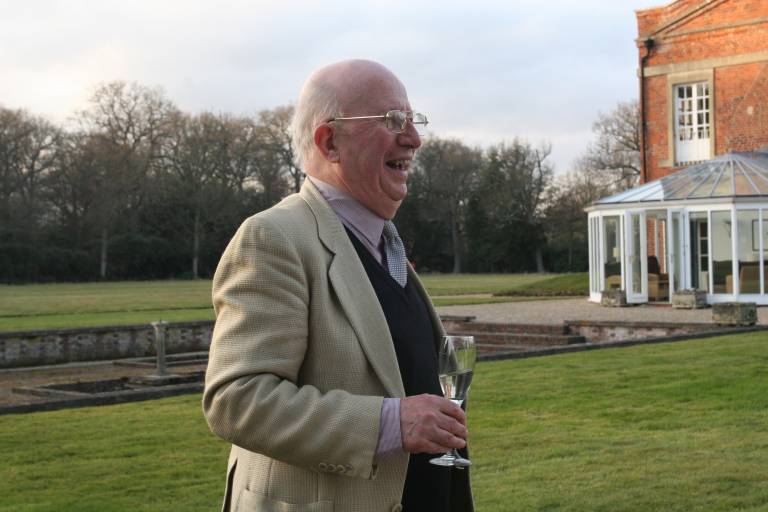Obituary: Trevor Thomas (1934–2020)
1 June 2020

Trevor Thomas taught European history and the history of the Habsburg Empire at SSEES from 1966 until his retirement in 1989. Even in retirement, he was a stalwart at SSEES parties, seminars, and guest lectures. His recollection of dates, the composition of government ministries, and apt quotations spoke to his voracious reading and elephantine memory. He spent lockdown happily with his books, peering over them with his trademark magnifying glass, until a chest infection took him to the Royal Free Hospital, where he died on 30 May.
Trevor’s published legacy is slender—just two articles in academic journals, a handful of reviews, and a single jointly-edited volume. He remained an ordinary lecturer throughout his career in the University of London. Yet look deeper—to the introductions of books and to the acknowledgement-pages in PhD theses on Central and East European history. He will be there— ‘My thanks are also due to …’, ‘Trevor Thomas read the entire manuscript and … ‘, and even ‘Trevor Thomas gave me a full three-hour tutorial in Bloomsbury to discuss the draft …’.
Trevor Thomas belonged to an older age of the universities, when reputation did not rest on metrics and outputs but on knowledge and the guidance offered to students and colleagues. Trevor was an authority on modern Central European history—he knew it in detail, from methods of conscription in the Napoleonic Wars to the constitutional mysteries of the 1867 Austro-Hungarian Settlement and the intricacies of interwar Czechoslovak party politics. He shared his knowledge with enthusiasm—commenting on graduate dissertations, intervening in seminars, and helping to re-write doctoral theses, even travelling to Poland and Pakistan to sort out students’ final drafts.
Trevor Thomas was brought up in the Wirral. The son of a local GP, he maintained a distrust of the medical profession until finally obliged in his early eighties to consult a doctor. After Higher National Certificate, he went up to Caius College Cambridge to read history, where he was taught, among others, by the distinguished scholar of Stuart England, John Kenyon. Trevor had been diffident and shy at Caius, and it was national service that made him. Attached to RAF Signals Intelligence, he learned Czech at JSSL Crail in Scotland, after which he was transferred to Berlin to listen into East German airforce communications. Unsurprisingly, his Czech was of no use, but his grasp of German improved.
Berlin intrigued Trevor—the divided capital of a former empire, it prompted all sorts of questions about fate, power, and the ways in which German hegemony in Central Europe had been maintained. Upon being demobbed, Trevor enlisted as a ‘returning’ undergraduate at the School of Slavonic and East European Studies at the University of London. He would remain there for the rest of his life—as an undergraduate, PhD student, and Lecturer in Czech and Slovak History.
Thomas put everything into his teaching. His lectures were authoritative, microscopic in their attention to detail, and enlivened by splenetic outbursts— ‘If another student writes that the Habsburg Empire was saved in 1848 by the disobedience of its generals, they will get a red line and a gamma!’ Students nonetheless warmed to him, for he was never less than generous with his time and cigarettes. He made it his business too to look after postgraduates and young lecturers, extending to them company, conviviality, and a seat in the bar of the Royal National Hotel, his final drinking place.
Universities had in the 1980s less room for the gentleman scholar than for the article-generating machine. Asked in 1989 by the director of the school just what his research was, Trevor surrendered and took early retirement. For the next thirty years, he did what he was best at—re-writing other people’s manuscripts and correcting the drafts of books and theses. His memory will endure in their prefaces and acknowledgements.
Written by his colleague and a close friend, Prof Martyn Rady
 Close
Close

